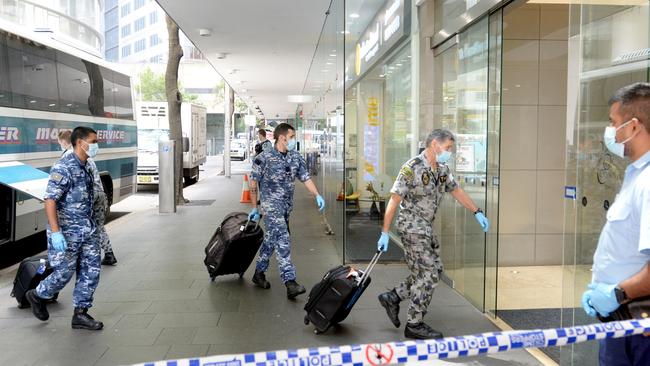Investigation probes if returned traveller caught COVID-19 in Sydney hotel quarantine
An investigation is under way to establish whether a traveller who returned from South America to Wollongong in NSW contracted COVID-19 while in hotel quarantine in Sydney.

An extensive investigation is under way to establish whether a traveller who returned from South America to their home in Wollongong in NSW contracted COVID-19 while in hotel quarantine in Sydney.
NSW Health began a frantic tracing effort on Monday to locate travellers who quarantined on the same floor at the Sofitel Wentworth, as authorities probed a possible link between the Wollongong case and several positive cases at the hotel.
The traveller who returned from South America on January 19 recorded two negative results during their time in quarantine before the positive test result on Saturday, sparking fears of a possible hotel quarantine leak.
“Several returned overseas travellers in the same quarantine hotel returned positive COVID-19 results while the case reported was undertaking quarantine,” the health authority said in a statement.
“NSW Health is investigating any potential links between these cases and (the latest) case.”
Testing lines stretched to hours on Monday as venues the person visited across Sydney and Wollongong since their release on February 2, including shopping centres and hospitality venues, were placed on high alert.
On Monday, NSW Health confirmed 10 close contacts were self-isolating and seven had tested negative. “Test results indicate that the person has a low level of infection and their household contacts have returned negative results to date,” NSW Health said.
ANU infectious diseases specialist associate professor Sanjaya Senanayake said there could be several explanations as to how the person tested positive after 14 days in quarantine.
“If it’s a new, more virulent strain, it’ll shorten the incubation period rather than make it longer; if there are new strains circulating including one that is less infectious, it could be the incubation getting longer,” he said.
“Sometimes it just happens; 99 per cent of cases occur within one to 14 days of being exposed and sometimes you get a case outside those days.”
The case ignited debate that 14 days in quarantine wasn’t long enough, with Scott Morrison on Monday saying the federal government would be guided by the Australian Health Protection Principal Committee.
“If they were to make recommendations along that line, then I’m sure that you would see the states and the commonwealth move in that direction but at this stage, that is not the advice of the medical experts,” the Prime Minister said.
Dr Senanayake said another explanation as to how the person tested negative over two weeks before testing positive upon release could be the result of prior exposure: “If this person has come from overseas … from a high case country, they may have symptomatic infection.”
ANU epidemiologist Peter Collignon said the case could be similar to a Queensland woman who tested positive in Maleny after release from Victorian hotel quarantine last month.




To join the conversation, please log in. Don't have an account? Register
Join the conversation, you are commenting as Logout